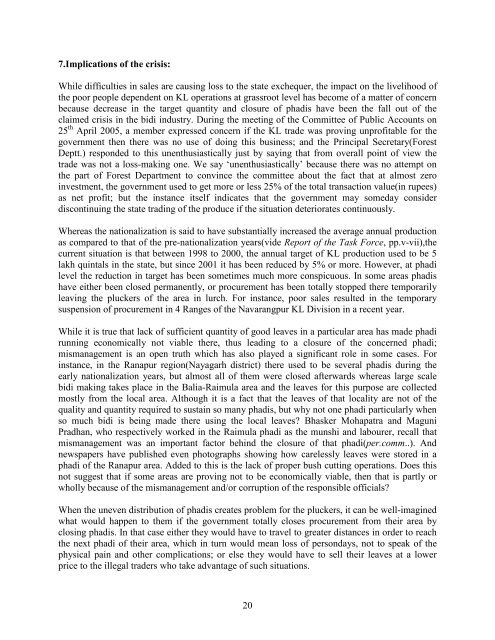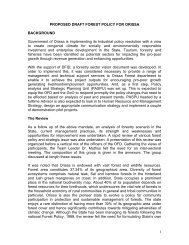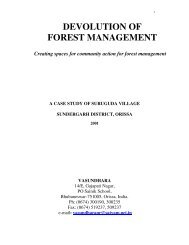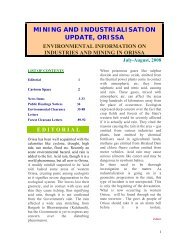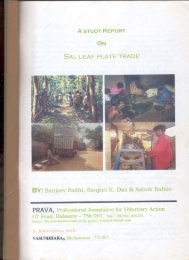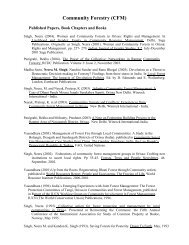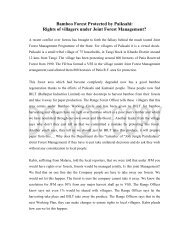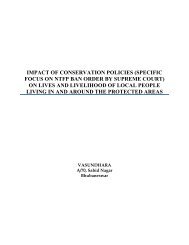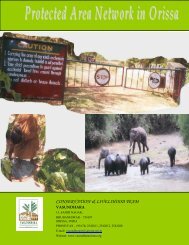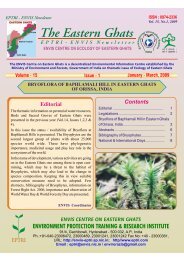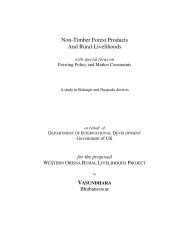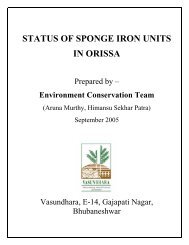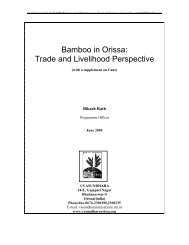The Kendu Leaf Trade: Problems & Prospects in Orissa - Vasundhara
The Kendu Leaf Trade: Problems & Prospects in Orissa - Vasundhara
The Kendu Leaf Trade: Problems & Prospects in Orissa - Vasundhara
You also want an ePaper? Increase the reach of your titles
YUMPU automatically turns print PDFs into web optimized ePapers that Google loves.
7.Implications of the crisis:<br />
While difficulties <strong>in</strong> sales are caus<strong>in</strong>g loss to the state exchequer, the impact on the livelihood of<br />
the poor people dependent on KL operations at grassroot level has become of a matter of concern<br />
because decrease <strong>in</strong> the target quantity and closure of phadis have been the fall out of the<br />
claimed crisis <strong>in</strong> the bidi <strong>in</strong>dustry. Dur<strong>in</strong>g the meet<strong>in</strong>g of the Committee of Public Accounts on<br />
25 th April 2005, a member expressed concern if the KL trade was prov<strong>in</strong>g unprofitable for the<br />
government then there was no use of do<strong>in</strong>g this bus<strong>in</strong>ess; and the Pr<strong>in</strong>cipal Secretary(Forest<br />
Deptt.) responded to this unenthusiastically just by say<strong>in</strong>g that from overall po<strong>in</strong>t of view the<br />
trade was not a loss-mak<strong>in</strong>g one. We say ‘unenthusiastically’ because there was no attempt on<br />
the part of Forest Department to conv<strong>in</strong>ce the committee about the fact that at almost zero<br />
<strong>in</strong>vestment, the government used to get more or less 25% of the total transaction value(<strong>in</strong> rupees)<br />
as net profit; but the <strong>in</strong>stance itself <strong>in</strong>dicates that the government may someday consider<br />
discont<strong>in</strong>u<strong>in</strong>g the state trad<strong>in</strong>g of the produce if the situation deteriorates cont<strong>in</strong>uously.<br />
Whereas the nationalization is said to have substantially <strong>in</strong>creased the average annual production<br />
as compared to that of the pre-nationalization years(vide Report of the Task Force, pp.v-vii),the<br />
current situation is that between 1998 to 2000, the annual target of KL production used to be 5<br />
lakh qu<strong>in</strong>tals <strong>in</strong> the state, but s<strong>in</strong>ce 2001 it has been reduced by 5% or more. However, at phadi<br />
level the reduction <strong>in</strong> target has been sometimes much more conspicuous. In some areas phadis<br />
have either been closed permanently, or procurement has been totally stopped there temporarily<br />
leav<strong>in</strong>g the pluckers of the area <strong>in</strong> lurch. For <strong>in</strong>stance, poor sales resulted <strong>in</strong> the temporary<br />
suspension of procurement <strong>in</strong> 4 Ranges of the Navarangpur KL Division <strong>in</strong> a recent year.<br />
While it is true that lack of sufficient quantity of good leaves <strong>in</strong> a particular area has made phadi<br />
runn<strong>in</strong>g economically not viable there, thus lead<strong>in</strong>g to a closure of the concerned phadi;<br />
mismanagement is an open truth which has also played a significant role <strong>in</strong> some cases. For<br />
<strong>in</strong>stance, <strong>in</strong> the Ranapur region(Nayagarh district) there used to be several phadis dur<strong>in</strong>g the<br />
early nationalization years, but almost all of them were closed afterwards whereas large scale<br />
bidi mak<strong>in</strong>g takes place <strong>in</strong> the Balia-Raimula area and the leaves for this purpose are collected<br />
mostly from the local area. Although it is a fact that the leaves of that locality are not of the<br />
quality and quantity required to susta<strong>in</strong> so many phadis, but why not one phadi particularly when<br />
so much bidi is be<strong>in</strong>g made there us<strong>in</strong>g the local leaves Bhasker Mohapatra and Maguni<br />
Pradhan, who respectively worked <strong>in</strong> the Raimula phadi as the munshi and labourer, recall that<br />
mismanagement was an important factor beh<strong>in</strong>d the closure of that phadi(per.comm..). And<br />
newspapers have published even photographs show<strong>in</strong>g how carelessly leaves were stored <strong>in</strong> a<br />
phadi of the Ranapur area. Added to this is the lack of proper bush cutt<strong>in</strong>g operations. Does this<br />
not suggest that if some areas are prov<strong>in</strong>g not to be economically viable, then that is partly or<br />
wholly because of the mismanagement and/or corruption of the responsible officials<br />
When the uneven distribution of phadis creates problem for the pluckers, it can be well-imag<strong>in</strong>ed<br />
what would happen to them if the government totally closes procurement from their area by<br />
clos<strong>in</strong>g phadis. In that case either they would have to travel to greater distances <strong>in</strong> order to reach<br />
the next phadi of their area, which <strong>in</strong> turn would mean loss of persondays, not to speak of the<br />
physical pa<strong>in</strong> and other complications; or else they would have to sell their leaves at a lower<br />
price to the illegal traders who take advantage of such situations.<br />
20


